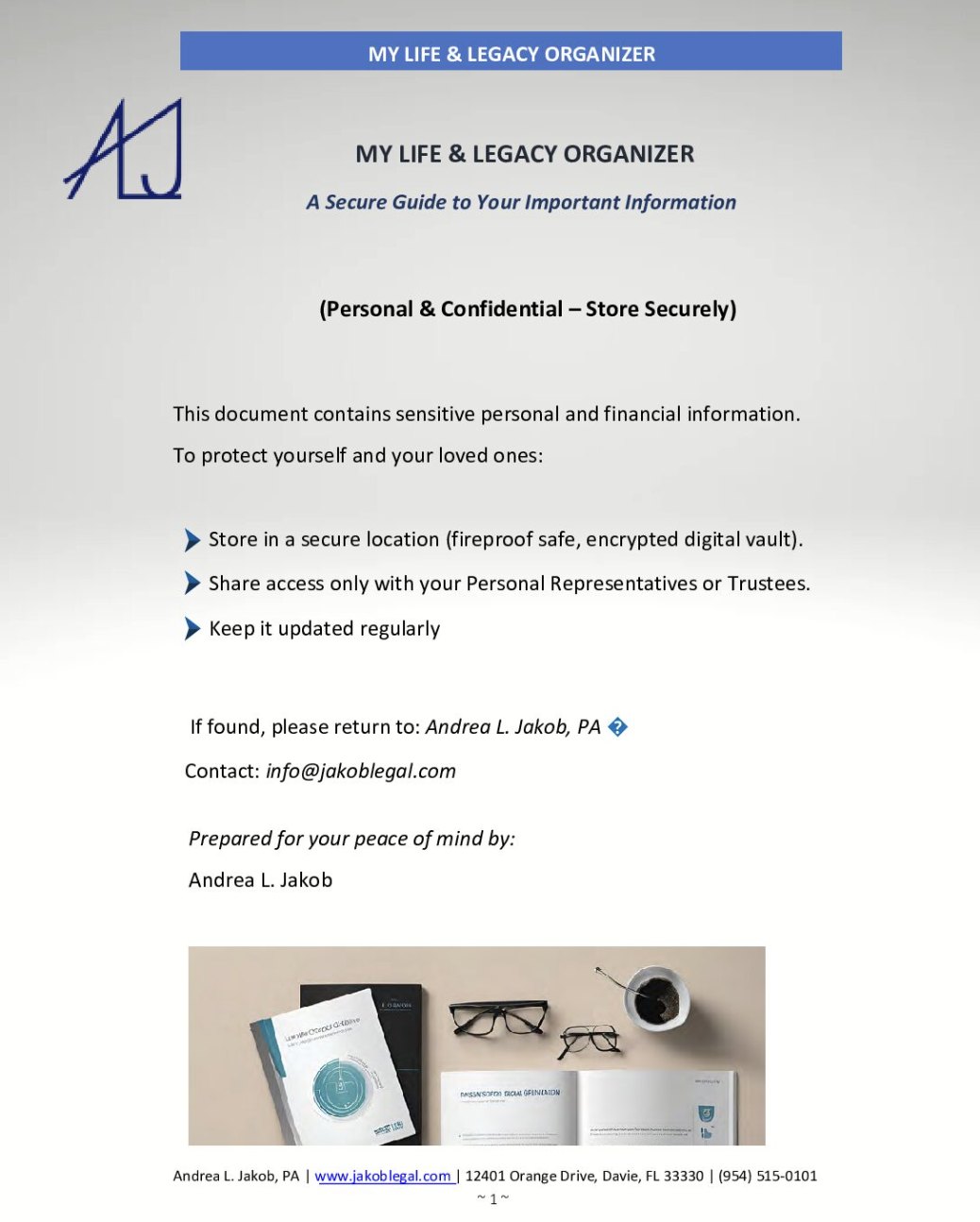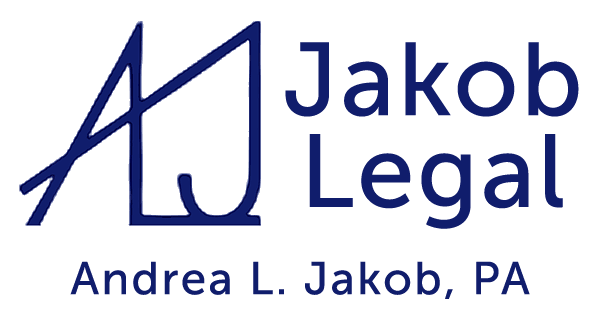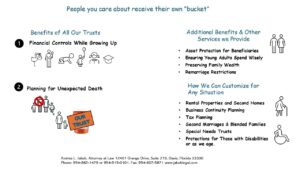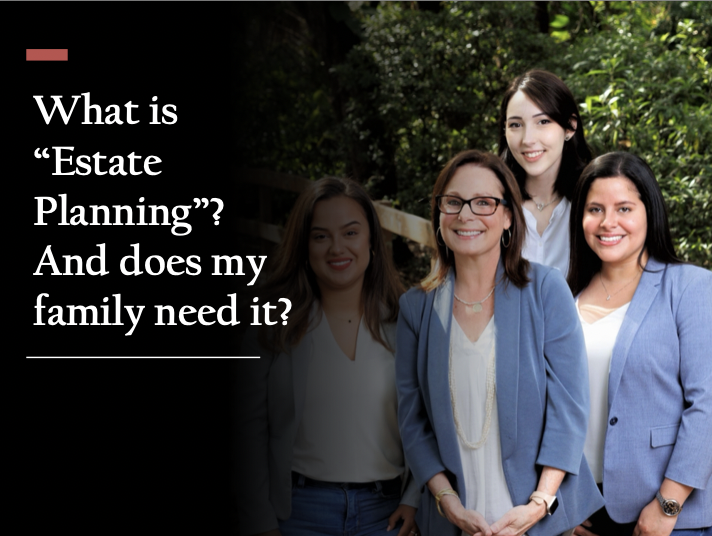Frequently Asked Questions
It all begins with a conversation. Contact us to get started!
- Call us. We set up your first attorney meeting.
- Meet your Client Coordinator. They guide you through the whole process.
- Meet with an Attorney and share your story. We talk about your family, goals, and worries.
- Fill out a simple form. Your coordinator helps, so it’s quick and easy.
- Lock in a signing date. You know exactly when your plan will be finished.
That’s the JakobLegal difference—clear steps, friendly help, and no surprises.
A valid question.
We start with a chat. We talk about your family, your assets, and your goals.
We “look under the hood.” Sometimes a client needs less work than they think. Other times they need more.
We quote a flat fee. You see the price, the work included, and any out-of-pocket costs before you sign. No hidden add-ons.
A revocable or living trust is a legal document often used as a means of avoiding probate and saving taxes at death. It is an instrument created to manage your assets while you are living and distributes your assets following your death. The trust is "revocable" since you can terminate it or change it at any time as long as you are living and not incapacitated.
Think of the trust as a "Bucket"- take a look at my diagram: Why a Trust Matters
An estate plan is planning for your life, future and peace of mind for you and your family. Estate planning doesn’t begin and end with your will, it is also about planning for what happens to you, your family and your property if you become mentally or physically incapacitated.
Many people believe they don’t need an Estate Plan; especially if their assets are modest or they are not yet retirement age. But everyone needs an estate plan. A will is a written legal document that specifies how and to whom you want your assets distributed after you are gone. If you die without a will (intestate), the State of Florida determines how your assets get divided, and who your beneficiaries will be. A judge will decide who handles the administration of your estate. For those with minor children, a Will is the only way to appoint a guardian for your child in the event of your death.
Every family is different, so their plans should be too. Here’s why:
- Different goals. Some people only need a simple will. Others want to avoid probate or cut taxes.
- Different assets. A small condo and a family business call for different tools.
- Different family shapes. Second marriages, young kids, or a loved one with special needs each add special rules.
- Different worries. One client may care most about privacy, another about keeping the peace between siblings.
A good estate-planning lawyer listens first, then builds the plan that fits your life—nothing more, nothing less.
You need to review your plan on a regular basis (every one to three years) to ensure that it still meets your estate planning goals.
We rebuilt the estate-planning process so you spend less time in a law office and more time living your life. Here’s our five-step promise:
- Straight talk, no jargon. We explain the law in plain words you can share with your family.
- Personal roadmap. Every plan is built around your goals—never a “one-size-fits-all” template.
- Hands-on guidance. Your Attorney, along with a dedicated Client Coordinator, will keep you on track from first call to final signing.
- Fast, fixed pricing. We quote a flat fee up front, so there are no billing surprises.
- Peace of mind, delivered. We help fund the trust, record deeds, and stay available for future questions.
Big firms can feel impersonal. Some solo shops never update their methods.
We sit in the middle—modern tools, personal service, family-style care.
1. Add our email address and website “jakoblegal.com” to your safe email list and
check your spam folder.
2. Homework. You will not be bombarded with homework but some questions will need
your response.
3. Please sign up for our newsletter! Whenever there is a change in the law or new
valuable information, we will share it with our clients in a newsletter.
4. Also please let us know if you’re receiving any emails in error. Our software is
constantly improving and evolving but sometimes it acts like a Tesla and it just drivesThe JakobLegal Difference
itself.
Wills must conform to Florida law and must clearly and unambiguously reflect your wishes. While it may be tempting to use do-it-yourself forms, remember that a Last Will and Testament is just that — it’s the last thing you’ll do. If a mistake is discovered after your death, you don’t get a second chance to make things right, this is not an area in which to be penny-wise and pound foolish.
Usually a good estate plan includes a Last Will and Testament, Advanced Health Care Directives (including a Health Care Surrogacy, HIPAA Release and Living Will,) and Durable Power of Attorney. Quite often we include a Revocable Living Trust as part of our client’s estate plan. A revocable living trust is usually known as an instrument to avoid probate, but it is also a powerful tool to keep your estate plan a private family matter and to protect you, your family and your assets during life, during life’s challenges and after you pass away.
Often disability planning is avoided during the estate planning process. This is a mistake since statistics show that while people are living longer, they are not necessarily living healthier. Aside from this, illnesses can arise, or accidents can occur, rendering you incapable of making personal and financial decisions. Therefore, your estate plan should address both planning for incapacity and planning for death.
I'm Ready to Start! After I call, what are the next steps?
Download Our Free Guide: What Is Estate Planning And Does My Family Need It?

Get The Ultimate Life Organizer
There's a lot to think about when you're collecting information for your estate plan. Download our free 17 page Complete Life Organizer and make sure you have everything covered!
Get The Organizer
*We value your privacy. We'll never rent or sell your information!*




